HVAC Companies Sandbach
Find the best HVAC Companies in Sandbach
Get multiple Air Conditioning Services quotes for your project today! Compare profiles, reviews, accreditations, portfolio, etc... and choose the best service.
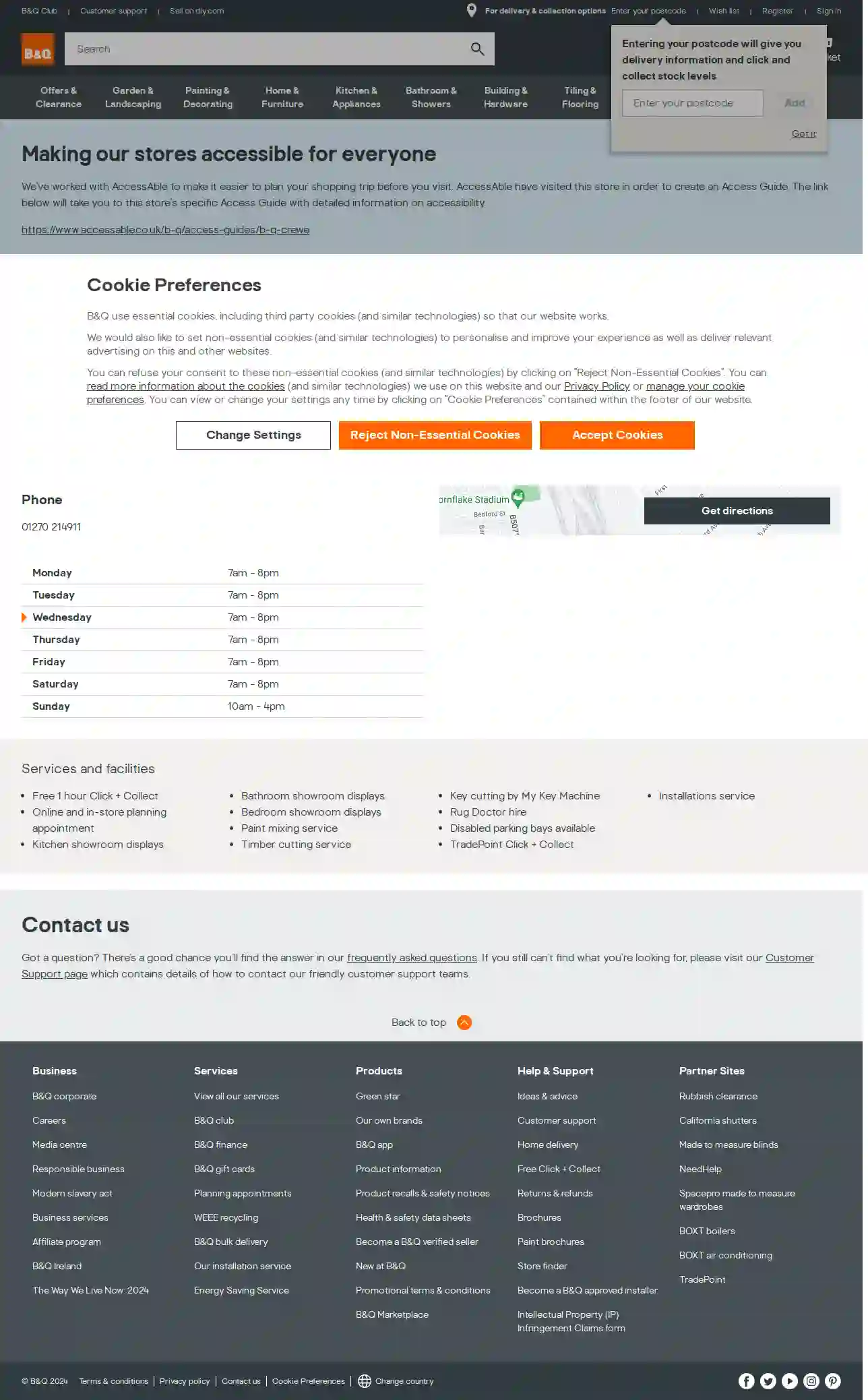
B&Q Crewe
4.1London Road, London, B&Q House, SW1A 1AA, GBB&Q is a leading home improvement retailer, offering a wide range of products and services to help customers create their perfect home. With over 300 stores across the UK and Ireland, B&Q is committed to providing excellent customer service and expert advice to help customers achieve their home improvement goals.
- Services
- Why Us?
- Accreditations
- Our Team
- Testimonials
- Gallery
Get Quote
Crewe Plumbing
585 reviewsCrewe Plumbing 1 Manor Ave, Crewe, CW2 8BD, GBCrewe Plumbing Ltd is a local friendly and reliable plumbing and heating company. Undertaking all plumbing and gas works with over 20 years of experience. Excellent rates, all work is guaranteed. Boiler installation, boiler service and repair, tap repairs, toilet repairs and installation, thermostatic and electric showers, bathroom installations, central heating pumps, radiators, towel radiators, garden taps, emergency call service, leak repairs and more! So if you’re looking for a plumbing company in Crewe with a no hassle plumbing service where all work exceeds expectations, meets deadlines and offers excellent value for money, we are the right choice.
- Services
- Why Us?
- Accreditations
- Gallery
Get Quote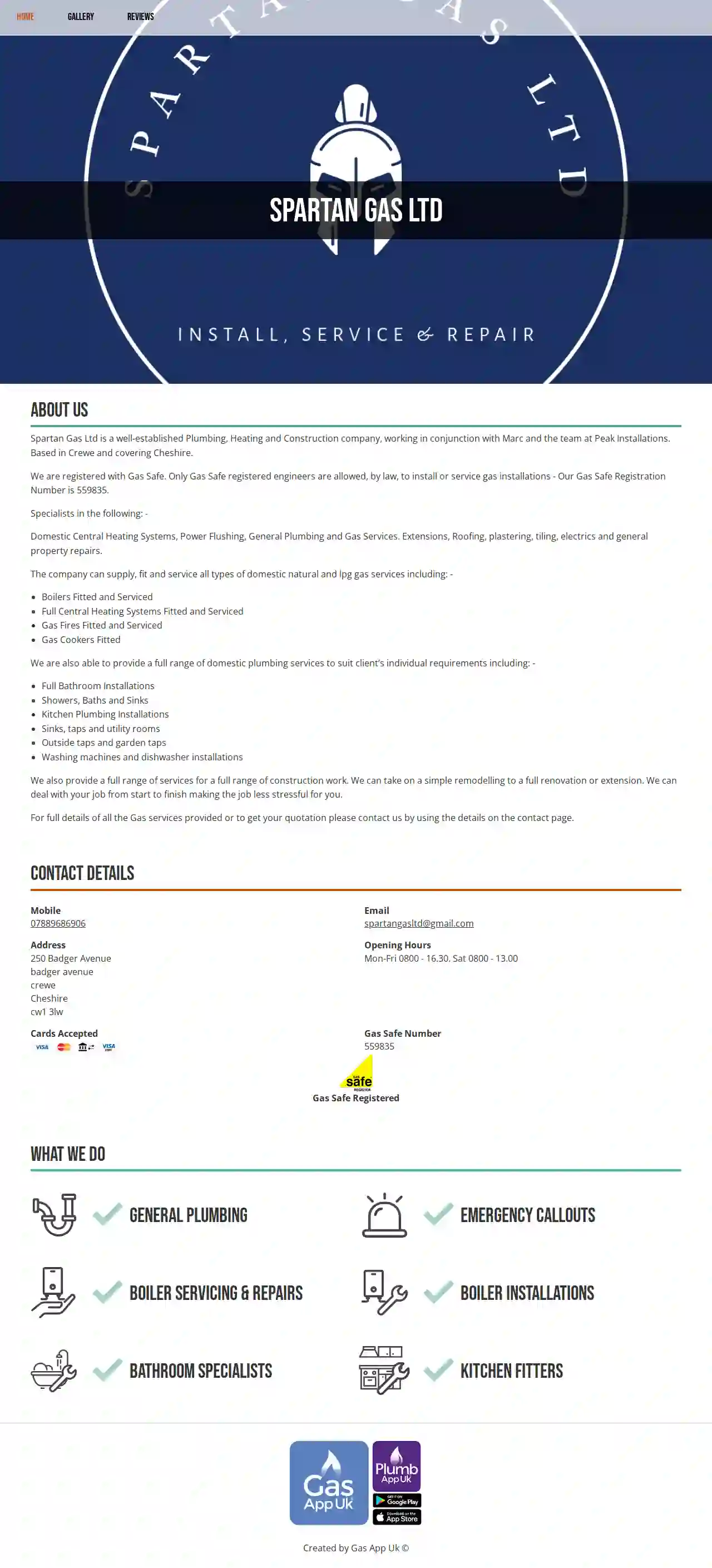
MJW Gas, Plumbing & Property Services
1.85 reviewsBadger Avenue, 250 Badger Avenue, Crewe, CW1 3LW, GBSpartan Gas Ltd is a well-established Plumbing, Heating and Construction company, working in conjunction with Marc and the team at Peak Installations. Based in Crewe and covering Cheshire. We are registered with Gas Safe. Only Gas Safe registered engineers are allowed, by law, to install or service gas installations - Our Gas Safe Registration Number is 559835. Specialists in the following: - Domestic Central Heating Systems, Power Flushing, General Plumbing and Gas Services. Extensions, Roofing, plastering, tiling, electrics and general property repairs. The company can supply, fit and service all types of domestic natural and lpg gas services including: - Boilers Fitted and Serviced, Full Central Heating Systems Fitted and Serviced, Gas Fires Fitted and Serviced, Gas Cookers Fitted. We are also able to provide a full range of domestic plumbing services to suit client’s individual requirements including: - Full Bathroom Installations, Showers, Baths and Sinks, Kitchen Plumbing Installations, Sinks, taps and utility rooms, Outside taps and garden taps, Washing machines and dishwasher installations. We also provide a full range of services for a full range of construction work. We can take on a simple remodelling to a full renovation or extension. We can deal with your job from start to finish making the job less stressful for you.
- Services
- Why Us?
- Accreditations
- Gallery
Get Quote
AC Comfort Air Conditioning
514 reviewsCrewe, GBAC Comfort is a company dedicated to providing high-quality air conditioning and ventilation solutions for both domestic and commercial clients. With over 8 years of experience in the industry, they offer a comprehensive range of services, including installation, repairs, and maintenance. Their team of experts is committed to delivering tailored solutions that meet the specific needs and budgets of each customer. AC Comfort prides itself on using cutting-edge technology and equipment from leading manufacturers like Fujitsu and Mitsubishi. They hold FGAS certificates, ensuring compliance with industry regulations and safety standards. Customers can benefit from a 5-year warranty on installations performed by AC Comfort. The company emphasizes personalized service, providing free consultations to assess individual requirements and develop customized installation projects. During these consultations, AC Comfort representatives evaluate installation costs, implementation timelines, and potential energy savings. AC Comfort's commitment to quality, safety, and customer satisfaction makes them a reliable choice for all air conditioning and ventilation needs.
- Services
- Why Us?
- Gallery
Get Quote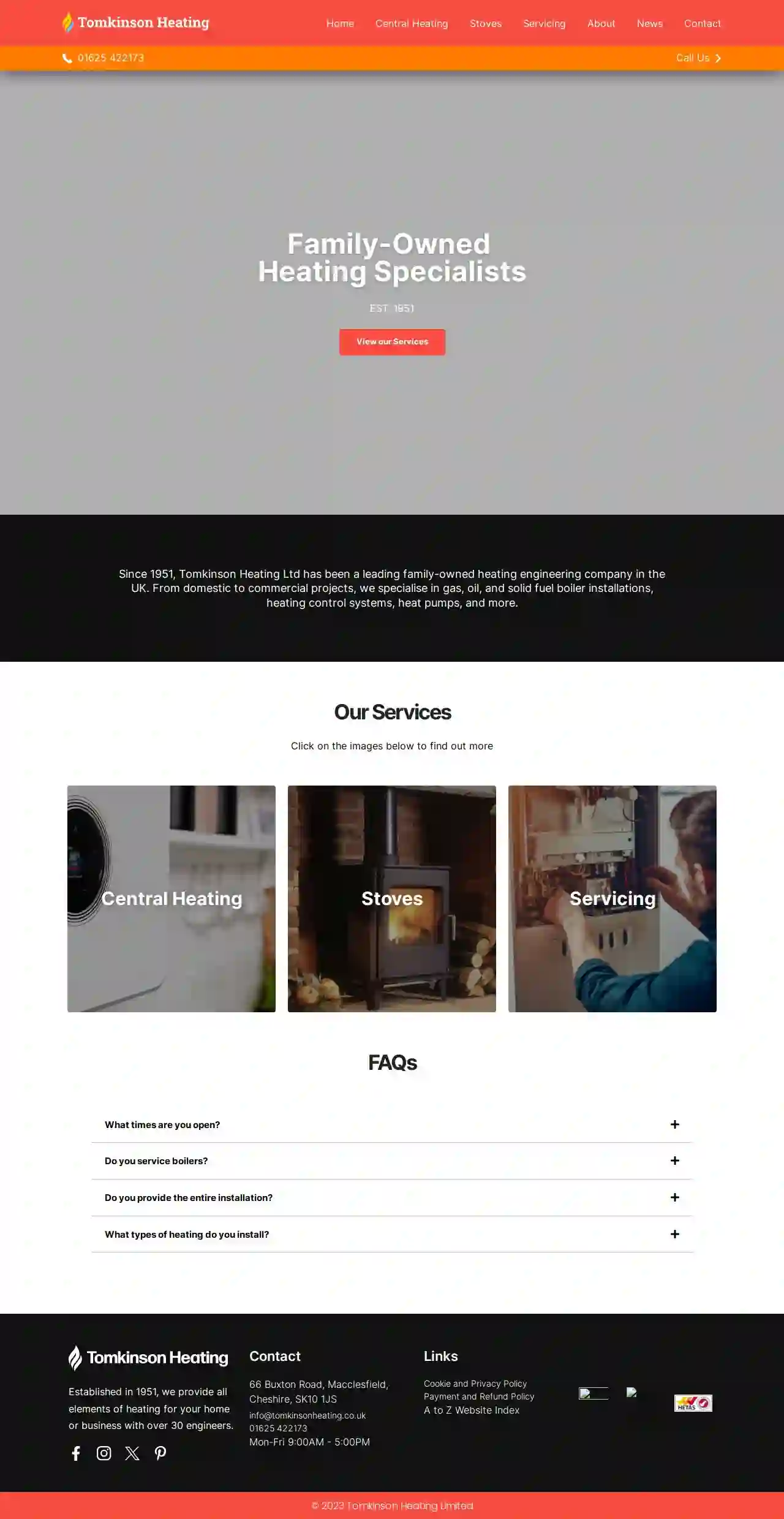
Tomkinson Heating Ltd
4.450 reviews66 Buxton Road, Macclesfield, SK10 1JS, GBSince 1951, Tomkinson Heating Ltd has been a leading family-owned heating engineering company in the UK. From domestic to commercial projects, we specialise in gas, oil, and solid fuel boiler installations, heating control systems, heat pumps, and more. Established in 1951, we provide all elements of heating for your home or business with over 30 engineers.
- Services
- Why Us?
- Gallery
Get Quote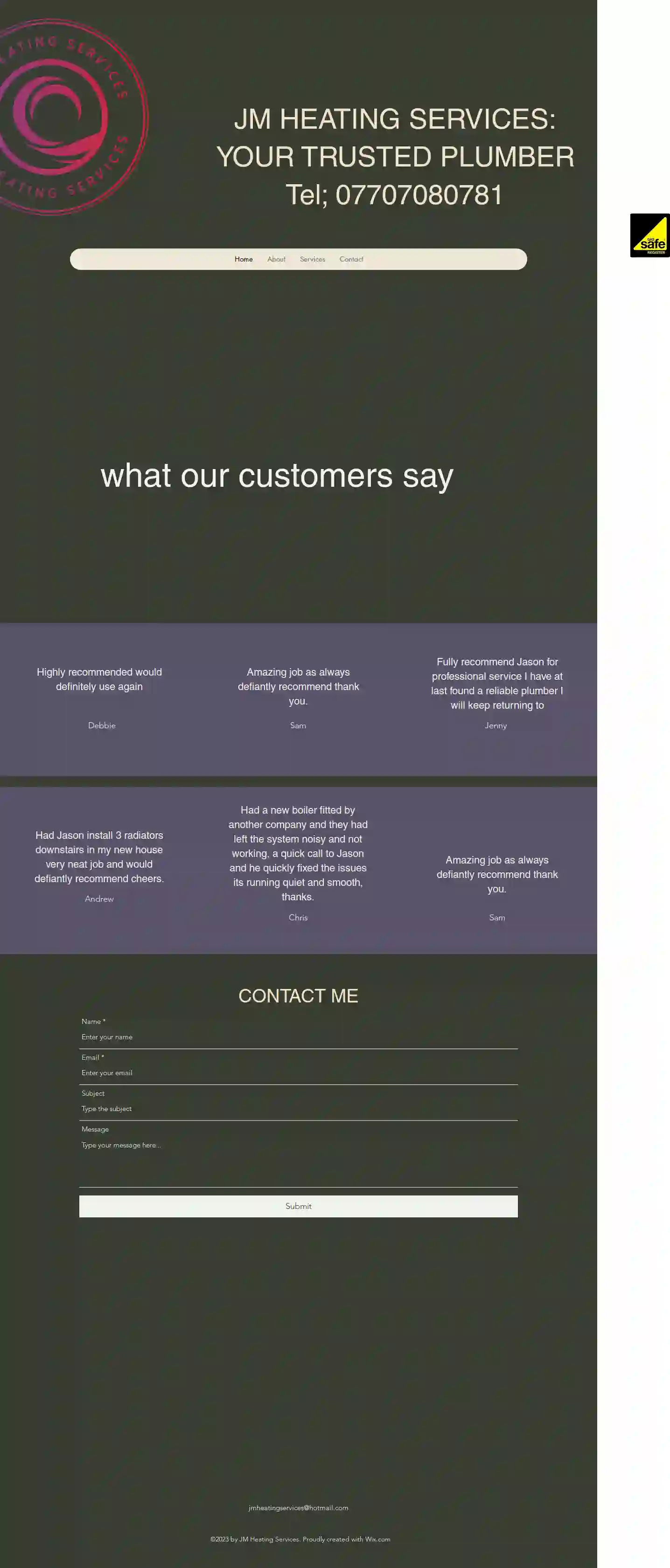
Jm Heating Services
52 reviewsCrewe, GBJM HEATING SERVICES: YOUR TRUSTED PLUMBER Tel; 07707080781
- Services
- Why Us?
- Testimonials
- Gallery
Get Quote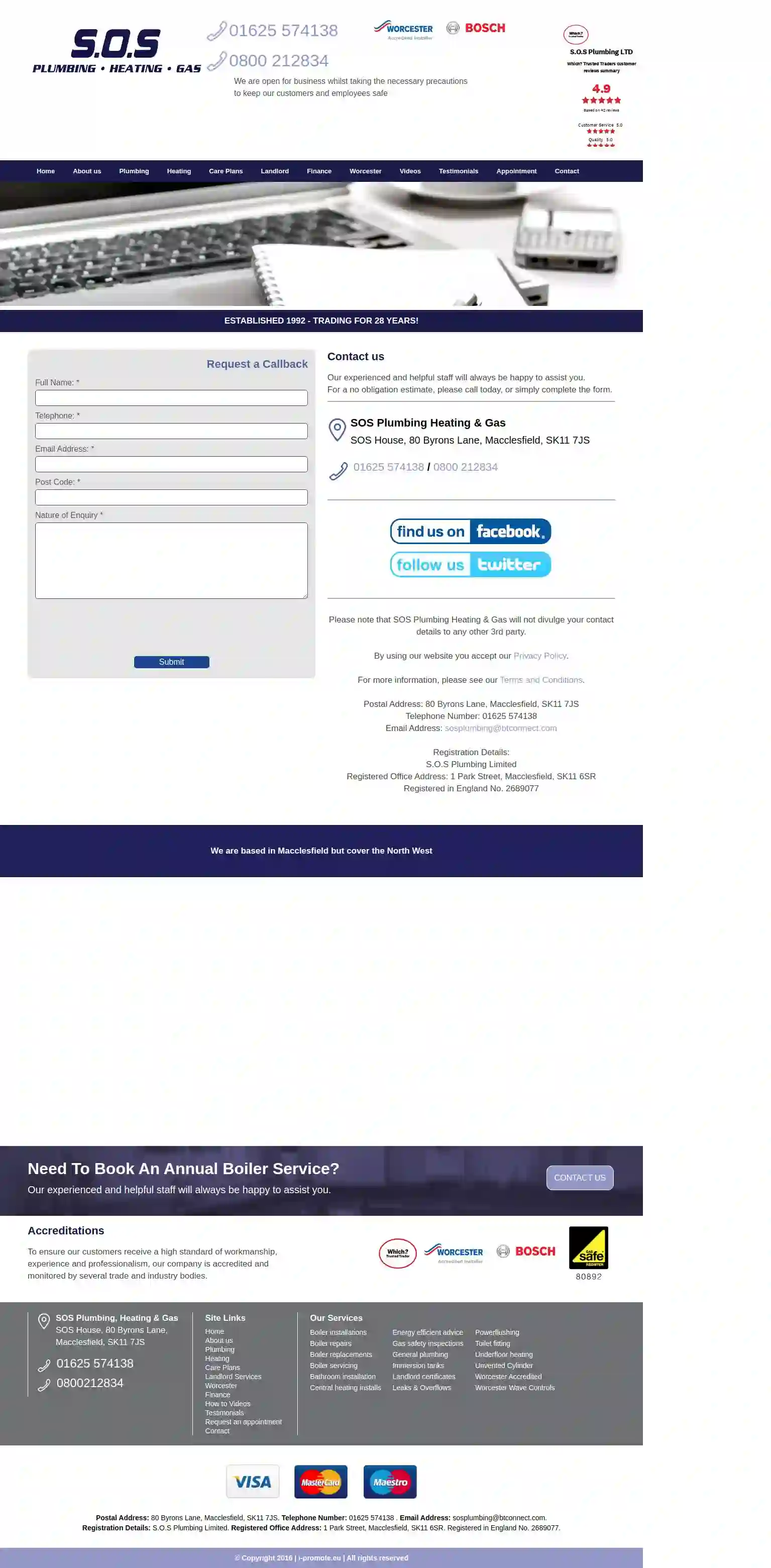
SOS Plumbing
51 reviewsSOS House, 80 Byrons Lane, Macclesfield, SK11 7JS, GBESTABLISHED 1992 - TRADING FOR 28 YEARS! S.O.S Plumbing was established in 1992. We have trading across the North West for 28 years in order to offer a quality plumbing, heating and gas breakdown service and maintenance company. 28 years later and we are still working to the same principles, providing a top class service to thousands of customers along the way. We have always, and still do, pride ourselves on our prompt, reliable, courteous and knowledgeable services. We pride ourselves in being an innovative company, keeping up to date with the latest products and systems to save our customers money and protect the environment. All our work is carried out by our own Gas Safe Registered engineers who all work to the highest standard with the minimum amount of disruption. We promise our customers the same high standard of service that our reputation has been built on for the past 28 years.
- Services
- Why Us?
- Accreditations
- Gallery
Get Quote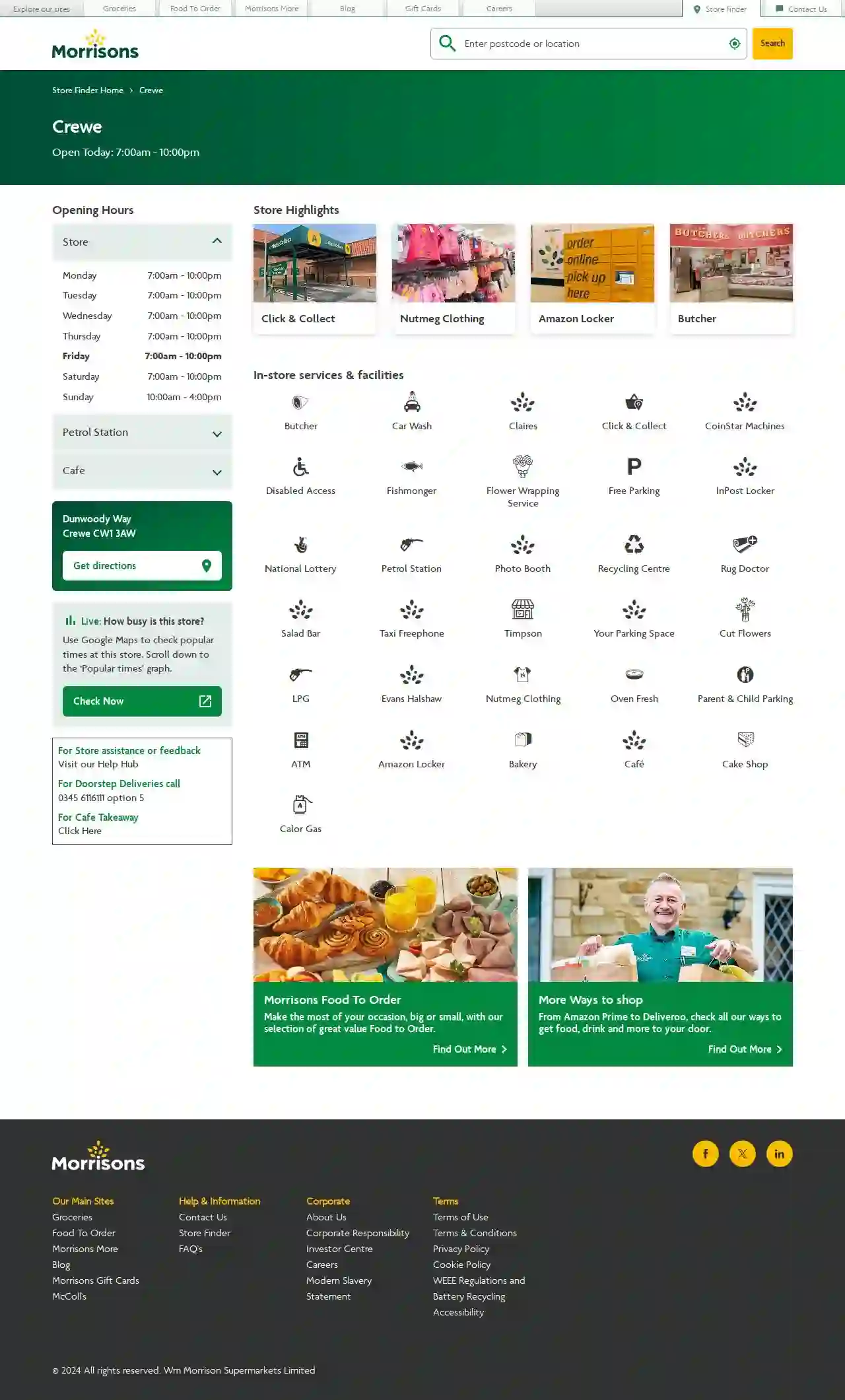
Morrisons
4.1Dunwoody Way, Crewe, CW1 3AW, GBMorrisons Crewe is your local supermarket, offering a wide range of groceries, fresh produce, and more. We're open 7 days a week, with extended hours for your convenience. Our friendly team is always on hand to help you find what you need. We also have a petrol station, cafe, and click & collect service available.
- Services
- Why Us?
- Gallery
Get Quote
NovaTherm Ltd
518 reviewsUnit 9-11, Withyfold Trading Estate, Withyfold Drive, Macclesfield, SK10 2ZR, GBWelcome to NovaTherm, a supplier of premium underfloor heating products. Our team has over 50 years combined experience in the plumbing and heating sector. We aim to provide products and services of the highest quality that aid in providing a more sustainable future for the world around us. As governments work towards attaining carbon neutral footprints, our team strives to educate customers on the benefits of sustainability and offer products at the best value for money. We have an in-house team of professional designers for underfloor heating systems and offer a free no-obligation design and quotation service. Our aim is to supply customers with a quality floor heating system that meets their individual requirements quickly and at a price that offers the best value for money.
- Services
- Why Us?
- Gallery
Get Quote
The Floor Heating Warehouse
4.19 reviewsUnknown, GBThe Floor Heating Warehouse Ltd is a professional design, supply, and consultation company specializing in water underfloor heating and electric underfloor heating systems. We offer a wide range of products and services, including design and quotation, free quotations, and customer comments and reviews. Our team is dedicated to providing the best possible solutions for our customers, with a focus on quality, reliability, and customer satisfaction.
- Services
- Why Us?
- Accreditations
- Gallery
Get Quote
Over 12,692+ HVAC Companies registered
Our HVAC experts operate in Sandbach & surroundings!
HVACCompaniesHub has curated and vetted the Best HVAC Companies in and around Sandbach. Find the most reliable business today.
Frequently Asked Questions About HVAC Companies
- Warm Air: The most noticeable sign is that the AC is blowing warm or lukewarm air.
- Ice Buildup: Ice may form on the AC unit.
- Increased Energy Bills: Your system has to work harder to cool, leading to higher energy consumption.
- Hissing or Bubbling Sounds: These sounds can indicate a refrigerant leak.
- AC not cooling: Refrigerant leaks, compressor issues, or thermostat problems.
- Furnace not heating: Pilot light or ignition control issues, blower motor problems, or clogged filters.
- Uneven temperatures: Ductwork leaks, inadequate insulation, or faulty thermostats.
- Poor air quality: Dirty air filters, mold growth in ductwork, or inadequate ventilation.
- Strange noises: Unusual sounds from the system can indicate a variety of problems with different components.
- High energy bills: Inefficient systems, ductwork leaks, or improper thermostat settings.
- Climate: Heat pumps are generally more efficient in moderate climates, while furnaces are better for colder regions.
- Budget: The upfront cost of different systems can vary significantly.
- Energy Efficiency Goals: Higher-efficiency systems are usually more expensive upfront but result in lower energy bills over time.
- Home Size and Layout: The square footage and layout of your home affect the system's capacity and ductwork requirements.
- Existing Ductwork: If you have existing ductwork, you'll need a system compatible with it.
What are the signs my air conditioner needs refrigerant?
What are the most common HVAC problems?
Common HVAC problems include:
What is the difference between an AC unit and a heat pump?
What type of HVAC system is best for my home?
What are the signs my air conditioner needs refrigerant?
- Warm Air: The most noticeable sign is that the AC is blowing warm or lukewarm air.
- Ice Buildup: Ice may form on the refrigerant lines or evaporator coil.
- Increased Energy Bills: Your system has to work harder to cool, leading to higher energy consumption.
- Hissing or Bubbling Sounds: These sounds may suggest a refrigerant leak.
What are the most common HVAC problems?
Common HVAC problems include:
- AC not cooling: Refrigerant leaks, compressor issues, or thermostat problems.
- Furnace not heating: Pilot light or ignition control issues, blower motor problems, or clogged filters.
- Uneven temperatures: Ductwork leaks, inadequate insulation, or faulty thermostats.
- Poor air quality: Dirty air filters, mold growth in ductwork, or inadequate ventilation.
- Strange noises: Unusual sounds from the system can indicate a variety of problems with different components.
- High energy bills: Inefficient systems, ductwork leaks, or improper thermostat settings.
What is the difference between an AC unit and a heat pump?
What type of HVAC system is best for my home?
- Climate: Heat pumps are generally more efficient in moderate climates, while furnaces are better for colder regions.
- Budget: The upfront cost of different systems can vary significantly.
- Energy Efficiency Goals: Higher-efficiency systems are usually more expensive upfront but result in lower energy bills over time.
- Home Size and Layout: The square footage and layout of your home affect the system's capacity and ductwork requirements.
- Existing Ductwork: If you have existing ductwork, you'll need a system compatible with it.